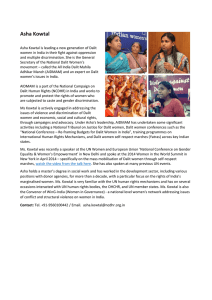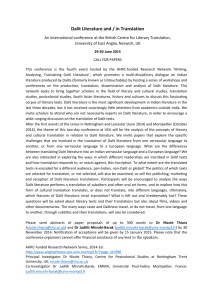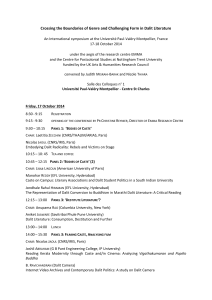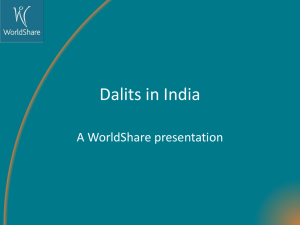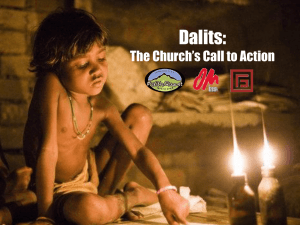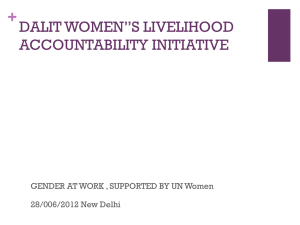Dalit Literature in Translation: Conference Bios
advertisement
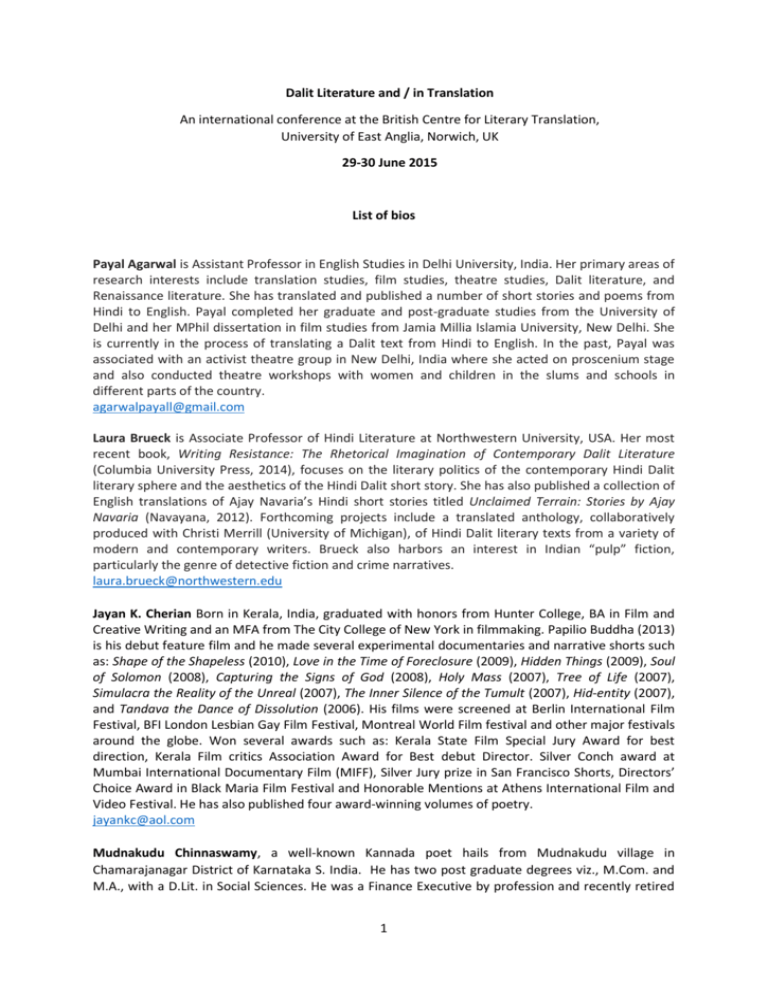
Dalit Literature and / in Translation An international conference at the British Centre for Literary Translation, University of East Anglia, Norwich, UK 29-30 June 2015 List of bios Payal Agarwal is Assistant Professor in English Studies in Delhi University, India. Her primary areas of research interests include translation studies, film studies, theatre studies, Dalit literature, and Renaissance literature. She has translated and published a number of short stories and poems from Hindi to English. Payal completed her graduate and post-graduate studies from the University of Delhi and her MPhil dissertation in film studies from Jamia Millia Islamia University, New Delhi. She is currently in the process of translating a Dalit text from Hindi to English. In the past, Payal was associated with an activist theatre group in New Delhi, India where she acted on proscenium stage and also conducted theatre workshops with women and children in the slums and schools in different parts of the country. agarwalpayall@gmail.com Laura Brueck is Associate Professor of Hindi Literature at Northwestern University, USA. Her most recent book, Writing Resistance: The Rhetorical Imagination of Contemporary Dalit Literature (Columbia University Press, 2014), focuses on the literary politics of the contemporary Hindi Dalit literary sphere and the aesthetics of the Hindi Dalit short story. She has also published a collection of English translations of Ajay Navaria’s Hindi short stories titled Unclaimed Terrain: Stories by Ajay Navaria (Navayana, 2012). Forthcoming projects include a translated anthology, collaboratively produced with Christi Merrill (University of Michigan), of Hindi Dalit literary texts from a variety of modern and contemporary writers. Brueck also harbors an interest in Indian “pulp” fiction, particularly the genre of detective fiction and crime narratives. laura.brueck@northwestern.edu Jayan K. Cherian Born in Kerala, India, graduated with honors from Hunter College, BA in Film and Creative Writing and an MFA from The City College of New York in filmmaking. Papilio Buddha (2013) is his debut feature film and he made several experimental documentaries and narrative shorts such as: Shape of the Shapeless (2010), Love in the Time of Foreclosure (2009), Hidden Things (2009), Soul of Solomon (2008), Capturing the Signs of God (2008), Holy Mass (2007), Tree of Life (2007), Simulacra the Reality of the Unreal (2007), The Inner Silence of the Tumult (2007), Hid-entity (2007), and Tandava the Dance of Dissolution (2006). His films were screened at Berlin International Film Festival, BFI London Lesbian Gay Film Festival, Montreal World Film festival and other major festivals around the globe. Won several awards such as: Kerala State Film Special Jury Award for best direction, Kerala Film critics Association Award for Best debut Director. Silver Conch award at Mumbai International Documentary Film (MIFF), Silver Jury prize in San Francisco Shorts, Directors’ Choice Award in Black Maria Film Festival and Honorable Mentions at Athens International Film and Video Festival. He has also published four award-winning volumes of poetry. jayankc@aol.com Mudnakudu Chinnaswamy, a well-known Kannada poet hails from Mudnakudu village in Chamarajanagar District of Karnataka S. India. He has two post graduate degrees viz., M.Com. and M.A., with a D.Lit. in Social Sciences. He was a Finance Executive by profession and recently retired 1 as Director (Finance) from Bangalore Metropolitan Transport Corporation. Poetry is his passion but he worked in other genres of literature as well, besides having a wide range of interests in culture, theatre, cinema and social work. He has brought out 25 books so far which include 6 collections of poetry, 4 of essays, 3 plays and a collection of short stories. A prominent dalit voice, he has established a niche for himself through his empirical imaging in mellowed tone. His works have been translated into other Indian vernaculars and widely published. Translations of the selected poems in English have been published in the literary journals like Indian Literature, The New Quest, Little Magazine and e-magazine Muse India (India). Translations have also been published in literary Magazines abroad (in Spanish Arquitrave (Columbia) and Hebrew in Helicon (Israel) in German Driesch Verlag (Austria) and so on. He has attended many International Poetry Conferences and extensively travelled. His poetry in Spanish translated by Rowena Hill ‘Poemas: Mudnakudu Chinnaswamy’ has been published by the Cultural Department of Venezuelan Govt. (CONAC) in 2004 under ‘World Poetry Series’. He is acclaimed to be the first poet from kannada lore to get published with an anthology in Spanish. He has directed two plays for theater groups one being ‘Bahurupi’ for the National Repertoire, Rangayana, Mysore. He has been associated in production of 2 feature films, one of which won gold medal from GOK. Besides he has acted in a documentary ‘maayaa loka’. He has been felicitated in and outside the country and graced with many awards including Karnataka Sahitya Academy Award in 2009 and Karnataka State Award in2014 for life time achievement. mudnakudu@gmail.com Kalyan Das teaches English literature and cultural studies at Presidency University, Kolkata, India. At Presidency he has been academically engaged with Subaltern related issues. His primary research area revolves around Dalit literature and Dalit historiography in contemporary West Bengal. His research also focuses on how the Subaltern Studies discourse has dealt with literature in their pursuit to create an alternative historiography. While considering both its contributions and limitations in terms of history and historiography, he has tried to look into various dalit narratives and dalit literature as an interdisciplinary area of research. His other research interests include postcolonial studies, New Literatures and theories of Nationalism, race, caste and sexuality. Kkdas87@gmail.com Mohan Dharavath graduated in Life Sciences from Nizam College (Osmania University). He did his post-graduation in English from EFL University, Hyderabad, where he is currently close to submitting his doctoral thesis. His research focuses on the Images of Adivasi in Indian Writing and looks at representations of tribals in Indian literature. His areas of interest are Adivasi and Dalit Studies, Folk Literature, Post-colonial Studies and Translation Studies. In 2011, he was in University of Dresden, Germany for six months on a DAAD fellowship to study different levels of researches of the IndoEuropean Tribes. Apart from several international conferences in various universities in India, he has also presented papers at Cambridge University, England and Universidad de Granada, Spain. In Cambridge, he participated in an oral narratives project organized by the World Oral Literature Project. His writings have been published in multiple anthologies and journals, including Routledge, The Commonwealth Review, etc. mohandharavath@gmail.com Joyjit Ghosh is Assistant Professor of English Literature in the Department of English, Vidyasagar University, Midnapore, West Bengal, India. Both his M.Phil and PhD dissertations were on the works of D.H.Lawrence. His book on the Letters of D.H. Lawrence, published by Authors Press is widely acclaimed. Presently he is working on a UGC research project on the works of Rabindranath Tagore. He is also a well known translator of Bengali (Bangla) Dalit poetry, whose translations have been 2 published by Muse India. He has presented a paper on Lawrence's letters in an international conference in Paris last April. Many of his research papers and translated poems (originally written by Bengali Dalit poets) have been published by Orient Blackswan and Atlantic publishers. pathu_ghosh@yahoo.co.in Rowena Hill was born in England in 1938, and went to school in New Zealand. She attended universities in New Zealand, Italy and India (University of Mysore). She taught English Literature at the Universidad de Los Andes in Mérida, Venezuela, where she has lived for forty years. She has published six books of poems in Spanish, as well as poems, essays and translations in periodicals in Venezuela, Colombia, India and USA, and lately on the internet. She has recently translated into English some of Venezuela’s best known poets. Her translations from Kannada include Naming the Nameless, metaphysical poems from ancient Kannada, Mysore, 1983, and the Spanish version, Nombres de lo Innombrable, Caracas, 1993; Poemas de Mudnakudu Chinnaswamy (selected poems of the dalit poet Mudnakudu Chinnaswamy, in Spanish), CONAC, Venezuelan Ministry of Culture, 2005; Flores de tierra dura, women poets of South India, Mérida, Venezuela, 2014. rowenahil@gmail.com Stephanie Kreiner is a research assistant at the Department for Anglophone Literatures and Literary Translation at Heinrich-Heine-Universität Düsseldorf. She holds a B.A. in English and Communication and Media Studies as well as a M.A. in Literary Translation for the languages English, Spanish and German. Both degrees have been awarded by the Heinrich-Heine-Universität Düsseldorf. During her studies she spent a semester at Anglia Ruskin University in Cambridge. In cooperation with the Austrian PEN-Club she has edited Aus dem Zwielicht – Vierzehn Einblicke in das Leben von Unberührbaren (2015), the German translation of an anthology of short stories by Dalit author Harish Mangalam. She has translated Harish Mangalam’s preface and written an afterword to this anthology about the concept of untouchability. Stephanie Kreiner freelances as an editor, proofreader and manuscript reviewer for several publishers. Her current research interests are intertextuality, textuality, translation theories and Dalit literature. kreiner@phil.hhu.de Sharankumar Limbale is a Professor and Director in School of Humanities and Social Science of Yashwantrao Chavan Maharashtra Open University, Nashik. He is the Author of Movement. He is known as an activist writer. To his credit are 50 books and 14 awards for his literary contribution as well as social work. His autobiography Akkarmashi (The Outcaste) is published by Oxford University Press in English. His book on criticism Towards on Esthetics of Dalit Literature is published by Orient BlackSwan, which is included in many university syllabi. There are 8 Ph.D. and 23 M.Phil Degrees awarded on Sharankumar Limbale’s writing. Sharankumar Limbale’s many books are translated in Indian regional languages and in English. He has delivered speeches in 11 International Seminars and 42 National Seminars as an invitee. His novel Hindu is available in English by Samya Publication, Kolkata. His short stories collection is forthcoming in English by Orient Blackswan. sharankumarlimbale@gmail.com Alok Mukherjee is the translator from the Marathi of Sharankumar Limbale’s Towards an Aesthetic of Dalit Literature (2004) and the author of This Gift of English: English Education and the Formation of Alternative Hegemonies in India (2009). He is currently completing work on a translation of Ramnath Chavan’s play, Shakshipuram, while gathering materials for an anthology of Dalit stories published in the past 25 years. Mukherjee has taught South Asian cultures and languages at York University, Toronto, Canada. He is a human rights activist, trainer and educator. a__mukherjee@sympatico.ca 3 Arun Mukherjee did her graduate work in English at the University of Saugar, India and came to Canada as a Commonwealth Scholar in 1971 to do a Ph.D. at the University of Toronto. Her current teaching interests are South Asian and Minority Canadian literatures. She is the author of The Gospel of Wealth in the American Novel: The Rhetoric of Dreiser and His Contemporaries (Rutledge Revivals, 2014; first published by Croom Helm 1987), Towards an Aesthetic of Opposition: Essays on Literature, Criticism and Cultural Imperialism (Williams-Wallace: 1988), Oppositional Aesthetics: Readings from a Hyphenated Space (TSAR: 1995), and Postcolonialism: My Living (TSAR: 1998). She has edited and written the Introduction of Sharing Our Experience (Canadian Advisory Council on the Status of Women: 1993), an anthology of autobiographical writings by aboriginal women and women of colour. She is a member of York Stories Editorial Collective which edited York Stories: Women in Higher Education (TSAR: 2000). Her translation of Dalit writer Omprakash Valmiki's autobiography Joothan: A Dalit's Life (Samya: Kolkata & Columbia U Press: 2003) won the New India Foundation Prize for “the finest book published in India during 2002-2003.” Her translation of Dalit writer Sharankumar Limbale's novel Hindu was published in 2010 (Samya Publications: Kolkata). As someone who became a refugee as a one year old when India was partitioned in 1947, she has a deep investment in working for human rights and justice. amukherj@yorku.ca Sipra Mukherjee is Associate Professor of English, West Bengal State University and currently Visiting Fellow (DSA) at the Department of English, University of Hyderabad. Her research areas are religion, caste and identity in South Asia, small religious sects, folklore, and twentieth century Indian and European literature. Sipra’s publications include Calcutta Mosaic: The Minority Communities of Calcutta, a Special Issue on ‘Religion and Language’ of International Journal of Sociology of Language, and articles on religious conversion, Ramakrishna Mission, Bengali Muslims, the Matua and Sahebdhani faiths and others. Her present research is on the demographic roots of folklore. mukherjeesipra@gmail.com Maya Pandit Narkar is a professor at the English and Foreign Languages University, Hyderabad and combines three disciplines in her academic and cultural work spread over 35 years. A Translation Studies scholar, she worked on the nineteenth century Marathi translations for her doctoral thesis and has produced more than 16 major works of translation from Marathi in to English and some from English into Marathi. As a Feminist Studies scholar, she has published extensively on women’s writing and produced a documentary film Voices from the Margins on Marathi dalit women writers. She was a Charles Wallace scholar at University of East Anglia. As an activist in women’s movement and experimental and street theatre, she worked extensively on issues of women, caste and class oppression. As an ELT scholar she has published many books on communicative English and teacher development programmes. Her publications include Gopal Ganesh Agarkar and Adventures with Grammar apart from many research papers in books and journals. She has participated in many international conferences and workshops in several countries. mayapandit@gmail.com Urmila Pawar was born in the small village in Ratnagiri as the youngest child of a Dalit family. She learned early in life the meaning of her subordination as a woman and as a Dalit. A prolific writer, her ten books published include three Short Story Collections; selected stories were translated into English as Mother Wit by Prof. Veena Deo of Hamline University USA. She has won many prestigious prizes for her sensitive exploration of the lives of Dalit women in India. Her Autobiography Aydaan is a part of Syllabus of the University of Columbia (USA) from 2009 and was translated into English, Hindi and Kannada. Recently Aydaan has been adapted for a Marathi play by legendry Marathi play 4 director Sushma Deshpande and is also in the process of being adapted in Hindi and English as well. Aydaan still continues to touch the heart of all lovers of Marathi literature. Pawar.urmila@yahoo.com Julia Perczel had worked at Navayana, the New Delhi based publishing house that brought out Ajay Navaria’s Unclaimed Terrain among other volumes of dalit literature and on caste from an anti caste perspective. She holds a BA from SOAS in Hindi and Development studies and an MA in Sociology and Anthropology from Central European University, Budapest. Having written her MA thesis on Navaria’s writing that emerges from the urban context of the New Delhi metropolis, she is eager to get more closely and ethnographically acquainted with the urban dalit living. The focus of this research will be the relationship between inter-jati difference making between different dalit castes and their voting practices—a particularly acute question in light of the result of the recent general elections. Currently she is enrolled in her second MA—Intensive South Asian Studies two-year—at SOAS, which provides the space, time and institutional support to complete this research. pupillala@gmail.com Mamta Sagar is a Kannada poet, playwright, translator and academic. She has five collections of poems, four plays, an anthology of column writing, a collection of critical essays on gender, language, literature and culture and a book on Slovenian-Kannada Literature Interactions to her credit. Her creative works and critical writings are published in anthologies and journals in India and abroad. Her poetry and plays are included within the educational textbooks of Jain University and Mahatma Gandhi University, India and the Cambridge University Press, UK. She has conducted theatre and poetry workshops culminating with readings and productions for women, children and people from marginalised communities. Her poems are composed with music by known musicians and used in Kannada cinemas. AUROPILIS invited her as Poet in Residence to Belgrade, Serbia in 2012. She is now visiting the UK on CWIT Translation Fellowship at UEA, Norwich. Mamta teaches at the Centre for Kannada Studies, Bangalore University, India. mamtasagar@gmail.com Jaydeep Sarangi is a leading scholar, poet and critic on marginal literatures and Indian Writing in English with twenty-nine books and hundred research articles. Widely anthologised and reviewed as a poet, and translator Dr Sarangi has delivered talks on translation studies in several countries and conducted workshops. He has translated Bengali dalit poems/stories into English as well as edited a number of anthologies of translations of Bengali Dalit writings. He has been collaborating with Stree Samya for translation of Bengali dalit autobiographies. Dr. Jaydeep Sarangi is Associate Professor in English, Dept. of English at Jogesh Chandra Chaudhuri College (Calcutta University). jaydeepsarangi@gmail.com Shoma Sen is currently teaching at the Department of English, Rashtrasant Tukdoji Maharaj University, Nagpur, India as an Associate Professor. Her areas of interest are Feminism, Gender Studies and Human Rights. She has published research papers and spoken at various platforms on related issues. She was invited as the Keynote speaker by Asia Pacific Research Network for an International Seminar, “Women Resisting Crisis and War” in the Philippines in 2010. She read a paper on “Women, Development and Displacement at a National Seminar organized by the Forum for Inclusive Growth, New Delhi, October 10, 2010, on “Subaltern Women’s Writing” at International Conference in Mumbai in October 2012 and on “Neo-Imperialism in Selected essays of Arundhati Roy” at an International conference at EFL-U, Hyderabad in Jan 2013. Shoma has also participated in civil society investigations on violations of human rights and in people’s tribunals. She has edited a magazine in English and Hindi related to the women’s movement in India. shomasen@hotmail.com 5 Shobha Padmakar Shinde is currently the Director, School of Language Studies and Research Centre, North Maharashtra University, Jalgaon. With a rich experience of teaching and research extending over a period of thirty years, she has won a national award for teaching excellence in English. She has published more than thirty research articles in national and international conferences in India and abroad. She has recently completed a major research project of the UGC on Indian Feminism and was actively involved in three Ford Foundation Project. Her interests range from Gender Studies, Critical Theories, Dalit Literature. She holds additional charge as the Head, Women’s Studies Centre at North Maharashtra University, Jalgaon. She has published four books related to theories and literary studies. shobha8@gmail.com 6
